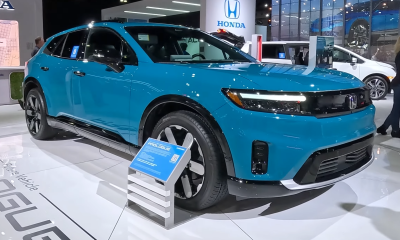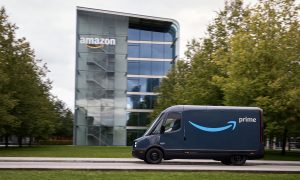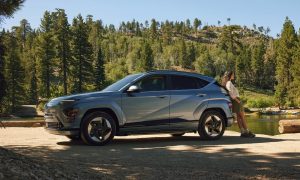A new report shows that commercial vehicles are much higher polluters than passenger vehicles despite making up a much smaller portion of cars on U.S. roads. For this reason, the study’s authors say the U.S. should prioritize electrifying the commercial vehicles sector rather than just focusing on passenger vehicles.
PepsiCo- and KPMG-backed software logistics company Adiona Tech shared the Connected Thinking report on Tuesday, which suggests that last-mile combination trucks be electrified as soon as possible to help fight CO2 emissions. The company says that all urban deliveries of groceries, parcels, furniture and other goods should be performed by electric vehicles (EVs) by 2025.
“Commercial vehicles are a much bigger polluter than passenger cars and they are in desperate need of modernization,” Adiona writes in the report. “Large combination trucks are just 1 percent of vehicles on the road, but they produce 18 percent of vehicle emissions.”
The study compared Bureau of Transportation Statistics figures from 2019 to those of 2020 and 2021, looking at vehicle miles driven by passenger cars and trucks, along with their associated emissions. What it found was that emissions decreased significantly in 2020 and 2021, while truck miles and their associated emissions increased above 18 percent of road traffic emissions.
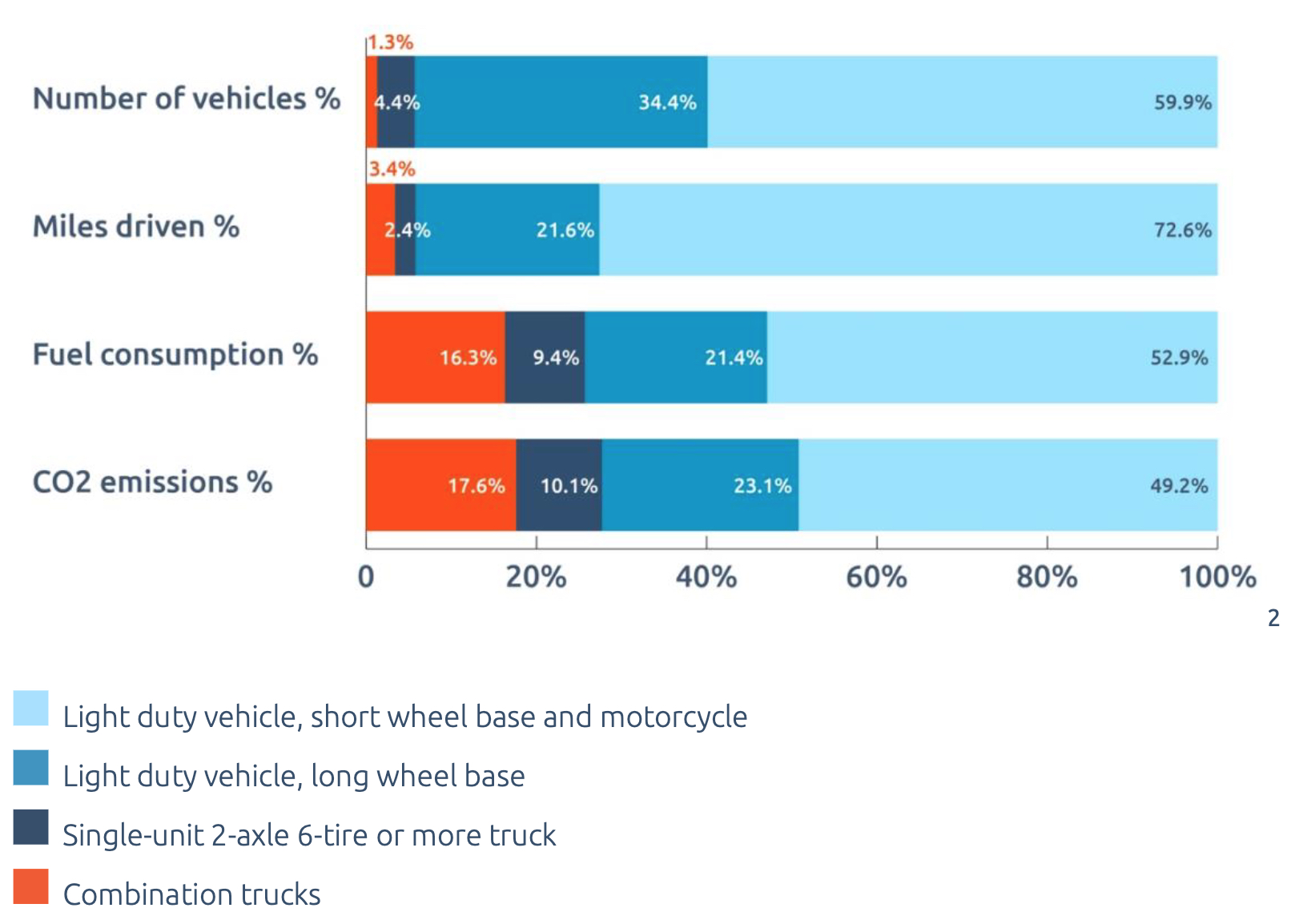
Sources: Connected Fleet data; BTS, fuel consumption by mode, additional combination truck stats, additional car stats, additional single-axle truck stats. Credit: Adiona Tech
The report included several key findings, notably including that the average fuel consumption of combination trucks is roughly 20 times higher than that of a passenger vehicle. The report also says that switching just five of these combination trucks to green alternatives — such as hydrogen fuel cells or lithium batteries — would be comparable to the effects of buying EVs for 100 households.
While the average truck drives about 22,930 miles annually, the report notes that large combination trucks travel an average of 59,929 miles in the same period, and single-unit trucks only average 12,278 miles annually.
According to data sourced from the Bureau of Transportation, light-duty vehicles with a short wheelbase have an average fuel consumption of 481 gallons per year, compared to 640 gallons consumed on average by light-duty vehicles with long wheelbases, and 1,639 gallons on average by single-unit, two-axle trucks with six tires or more. However, the data also shows that combination trucks consume an average of 9,909 gallons annually.
In a press release, Adiona Tech CEO Richard Savoie highlights the need to prioritize larger freight in the fight against carbon emissions, beginning with those that travel the most.
“America needs to aggressively decarbonize the biggest emitters on the road, large freight and delivery vehicles,” Savoie said in the release. “The US automotive industry is at a crossroads, but it needs to act now to electrify every car on the road. Doing so requires connected thinking and collective action. We cannot transform the national fleet of nearly 300 million vehicles overnight, so we need to make decisions that make the biggest difference, for the lowest effort first.”
The passenger vehicle sector has adopted EVs much more quickly than others, as several automakers have now followed Tesla’s lead in building fully electric vehicles. While electrifying every car is still an important goal, Savoie explains, it shouldn’t be the only one.
“Frankly, the data shows that consumer adoption of EVs should not be America’s number one priority,” Savoie said. “Electrifying fleets is by far the most efficient way to reduce vehicle emissions. Every battery we put in a combination truck counts for 20 households buying an EV, and businesses often have fleets of hundreds of vehicles.”
“We must prioritize the electrification of these vehicles that are on the road most, travel the longest distances, and are the least fuel-efficient,” Savoie added.
Several companies have begun piloting or at least stated plans to purchase electric last-mile delivery vehicles, including FedEx, Amazon, Walmart and more.
Adiona Tech backer PepsiCo is one of the first companies to have begun electrifying its semi-truck fleet after purchasing an initial batch of Tesla Semis last year. A recent event showed some serious range results for the Semi, and PepsiCo detailed last month how the truck was helping it reach its own sustainability goals.
You can read the full report from Adiona Tech here.
What are your thoughts? Let me know at zach@teslarati.com, find me on X at @zacharyvisconti, or send your tips to us at tips@teslarati.com.
News
Tesla China breaks 8-month slump by selling 71,599 vehicles wholesale in June
Tesla China’s June numbers were released by the China Passenger Car Association (CPCA) on Tuesday.
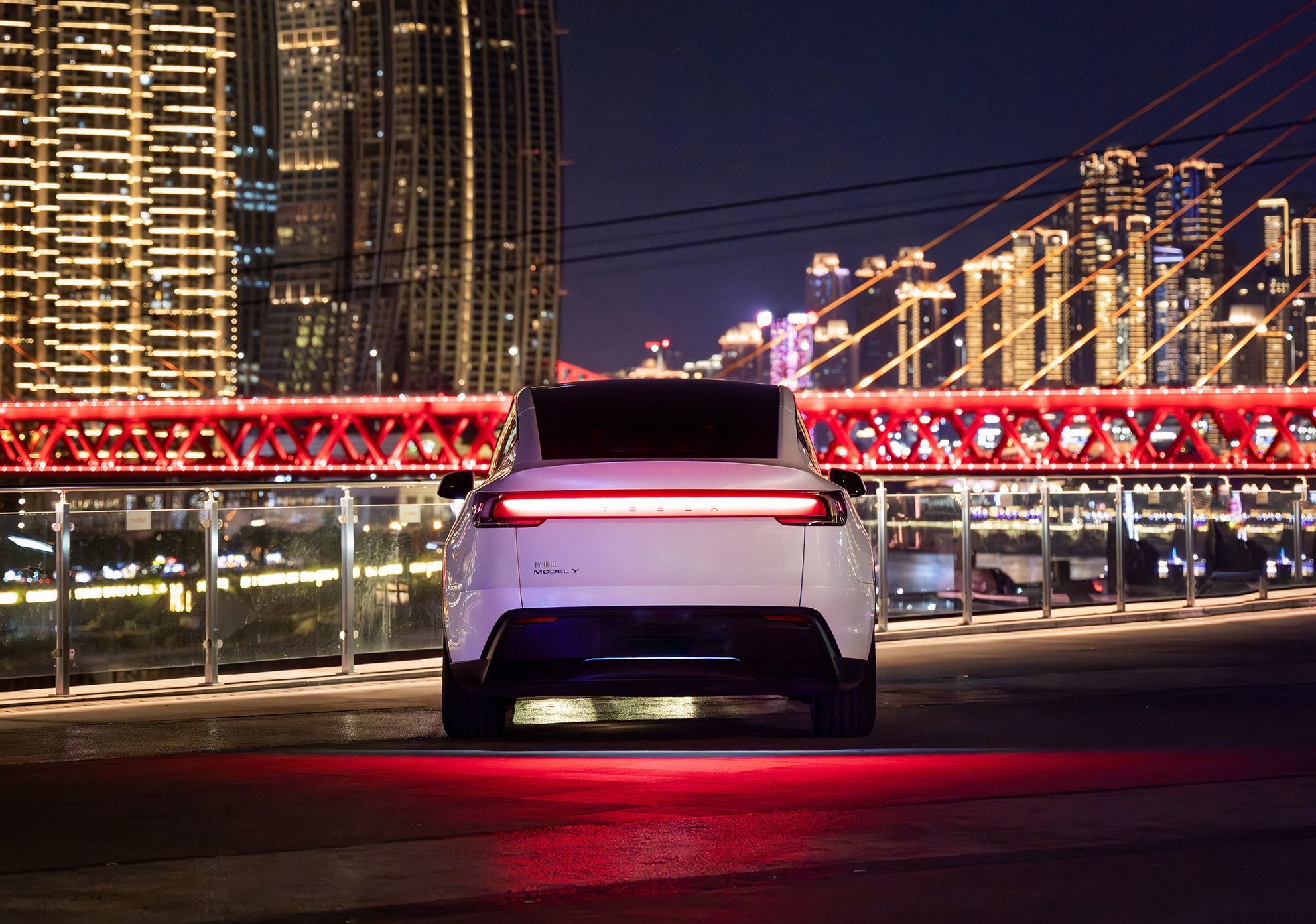
Tesla China was able to sell 71,599 vehicles wholesale in June 2025, reversing eight consecutive months of year-over-year declines. The figure marks a 0.83% increase from the 71,599 vehicles sold wholesale in June 2024 and a 16.1% jump compared to the 61,662 vehicles sold wholesale in May.
Tesla China’s June numbers were released by the China Passenger Car Association (CPCA) on Tuesday.
Tesla China’s June results in focus
Tesla produces both the Model 3 and Model Y at its Shanghai Gigafactory, which serves as the company’s primary vehicle export hub. Earlier this year, Tesla initiated a changeover for its best-selling vehicle, the Model Y, resulting in a drop in vehicle sales during the first and second quarters.
Tesla’s second-quarter China sales totaled 191,720 units including exports. While these numbers represent a 6.8% year-over-year decline for Tesla China, Q2 did show sequential improvement, rising about 11% from Q1 2025, as noted in a CNEV Post report.
For the first half of the year, Tesla sold 364,474 vehicles wholesale. This represents a 14.6% drop compared to the 426,623 units sold wholesale in the first half of 2024.
China’s competitive local EV market
Tesla’s position in China is notable, especially as the new Model Y is gaining ground in the country’s BEV segment. That being said, Tesla is also facing competition from impressive local brands such as Xiaomi, whose new YU7 electric SUV is larger and more affordable than the Model Y.
The momentum of the YU7 is impressive, as the vehicle was able to secure 200,000 firm orders within three minutes and over 240,000 locked-in orders within 18 hours. Xiaomi’s previous model, the SU7 electric sedan, which is aimed at the Tesla Model 3, also remains popular, with June deliveries surpassing 25,000 units for the ninth straight month.
While China’s EV market is getting more competitive, Tesla’s new Model Y is also ramping its production and deliveries. Needless to say, Tesla China’s results for the remaining two quarters of 2025 will be very interesting.
Elon Musk
Tesla reveals it is using AI to make factories more sustainable: here’s how
Tesla is using AI in its Gigafactory Nevada factory to improve HVAC efficiency.

Tesla has revealed in its Extended Impact Report for 2024 that it is using Artificial Intelligence (AI) to enable its factories to be more sustainable. One example it used was its achievement of managing “the majority of the HVAC infrastructure at Gigafactory Nevada is now AI-controlled” last year.
In a commitment to becoming more efficient and making its production as eco-friendly as possible, Tesla has been working for years to find solutions to reduce energy consumption in its factories.
For example, in 2023, Tesla implemented optimization controls in the plastics and paint shops located at Gigafactory Texas, which increased the efficiency of natural gas consumption. Tesla plans to phase out natural gas use across its factories eventually, but for now, it prioritizes work to reduce emissions from that energy source specifically.
It also uses Hygrometric Control Logic for Air Handling Units at Giafactory Berlin, resulting in 17,000 MWh in energy savings each year. At Gigafactory Nevada, Tesla saves 9.5 GWh of energy through the use of N-Methylpyrrolidone refineries when extracting critical raw material.
Perhaps the most interesting way Tesla is conserving energy is through the use of AI at Gigafactory Nevada, as it describes its use of AI to reduce energy demand:
“In 2023, AI Control for HVAC was expanded from Nevada and Texas to now include our Berlin-Brandenburg and Fremont factories. AI Control policy enables HVAC systems within each factory to work together to process sensor data, model factory dynamics, and apply control actions that safely minimize the energy required to support production. In 2024, this system achieved two milestones: the majority of HVAC infrastructure at Gigafactory Nevada is now AI-controlled, reducing fan and thermal energy demand; and the AI algorithm was extended to manage entire chiller plants, creating a closed-loop control system that optimizes both chilled water consumption and the energy required for its generation, all while maintaining factory conditions.”
Tesla utilizes AI Control “primarily on systems that heat or cool critical factory production spaces and equipment.” AI Control communicates with the preexisting standard control logic of each system, and any issues can be resolved by quickly reverting back to standard control. There were none in 2024.
Tesla says that it is utilizing AI to drive impact at its factories, and it has proven to be a valuable tool in reducing energy consumption at one of its facilities.
Elon Musk
Tesla analysts believe Musk and Trump feud will pass
Tesla CEO Elon Musk and U.S. President Donald Trump’s feud shall pass, several bulls say.

Tesla analysts are breaking down the current feud between CEO Elon Musk and U.S. President Donald Trump, as the two continue to disagree on the “Big Beautiful Bill” and its impact on the country’s national debt.
Musk, who headed the Department of Government Efficiency (DOGE) under the Trump Administration, left his post in May. Soon thereafter, he and President Trump entered a very public and verbal disagreement, where things turned sour. They reconciled to an extent, and things seemed to be in the past.
However, the second disagreement between the two started on Monday, as Musk continued to push back on the “Big Beautiful Bill” that the Trump administration is attempting to sign into law. It would, by Musk’s estimation, increase spending and reverse the work DOGE did to trim the deficit.
Every member of Congress who campaigned on reducing government spending and then immediately voted for the biggest debt increase in history should hang their head in shame!
And they will lose their primary next year if it is the last thing I do on this Earth.
— Elon Musk (@elonmusk) June 30, 2025
President Trump has hinted that DOGE could be “the monster” that “eats Elon,” threatening to end the subsidies that SpaceX and Tesla receive. Musk has not been opposed to ending government subsidies for companies, including his own, as long as they are all abolished.
How Tesla could benefit from the ‘Big Beautiful Bill’ that axes EV subsidies
Despite this contentious back-and-forth between the two, analysts are sharing their opinions now, and a few of the more bullish Tesla observers are convinced that this feud will pass, Trump and Musk will resolve their differences as they have before, and things will return to normal.
ARK Invest’s Cathie Wood said this morning that the feud between Musk and Trump is another example of “this too shall pass:”
BREAKING: CATHIE WOOD SAYS — ELON AND TRUMP FEUD “WILL PASS” 👀 $TSLA
She remains bullish ! pic.twitter.com/w5rW2gfCkx
— TheSonOfWalkley (@TheSonOfWalkley) July 1, 2025
Additionally, Wedbush’s Dan Ives, in a note to investors this morning, said that the situation “will settle:”
“We believe this situation will settle and at the end of the day Musk needs Trump and Trump needs Musk given the AI Arms Race going on between the US and China. The jabs between Musk and Trump will continue as the Budget rolls through Congress but Tesla investors want Musk to focus on driving Tesla and stop this political angle…which has turned into a life of its own in a roller coaster ride since the November elections.”
Tesla shares are down about 5 percent at 3:10 p.m. on the East Coast.
-

 Elon Musk2 days ago
Elon Musk2 days agoTesla investors will be shocked by Jim Cramer’s latest assessment
-

 News7 days ago
News7 days agoTesla Robotaxi’s biggest challenge seems to be this one thing
-

 News2 weeks ago
News2 weeks agoTesla’s Grok integration will be more realistic with this cool feature
-

 Elon Musk2 weeks ago
Elon Musk2 weeks agoElon Musk slams Bloomberg’s shocking xAI cash burn claims
-

 News2 weeks ago
News2 weeks agoTesla China roars back with highest vehicle registrations this Q2 so far
-

 News2 weeks ago
News2 weeks agoTexas lawmakers urge Tesla to delay Austin robotaxi launch to September
-

 News2 weeks ago
News2 weeks agoTesla dominates Cars.com’s Made in America Index with clean sweep
-

 Elon Musk1 week ago
Elon Musk1 week agoFirst Look at Tesla’s Robotaxi App: features, design, and more





